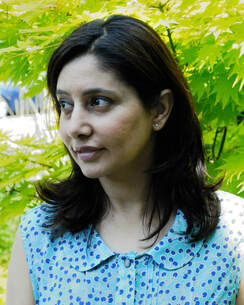Kavita A. Jindal
|
Kavita A. Jindal is a prize-winning writer and editor whose work has appeared in literary journals and anthologies in the UK and around the world. Her short stories have been broadcast on BBC Radio 4, and her poems on Zee TV and European radio stations. She is the author of Raincheck Renewed, published to critical acclaim by Chameleon Press. She won the Brighthorse Novel Prize in 2018 and the Foyles-Vintage ‘Haruki Murakami’ Prize in 2012. She received the Word Masala Award for Excellence in Poetry in 2016. She is the co-founder of ‘The Whole Kahani’ – a collective of British Asian writers whose anthology of poetry and short fiction May We Borrow Your Country was published by Linen Press in January 2019. Kavita also serves as a Senior Editor at Asia Literary Review. www.kavitajindal.com @writerkavita
|
“My topics are eclectic: a poem happens when I come across a subject, news-item or rediscovered memory that makes me want to respond in the form of a poem."
Interviews:
On Raincheck Renewed, in conversation with Patricia Neculae, who translated the collection into Romanian:
https://kavitajindal.com/wp-content/uploads/2018/04/Interview-with-Patricia-Neculae-June-2009.pdf
On the poem Kabariwala, which is included in 100 Great Indian Poems, scroll to the end of the review to read the interview:
https://www.desiblitz.com/content/100-great-indian-poems-poetic-feat-feast
Interviews with Kavita A. Jindal: https://kavitajindal.com/interviews/
https://kavitajindal.com/wp-content/uploads/2018/04/Interview-with-Patricia-Neculae-June-2009.pdf
On the poem Kabariwala, which is included in 100 Great Indian Poems, scroll to the end of the review to read the interview:
https://www.desiblitz.com/content/100-great-indian-poems-poetic-feat-feast
Interviews with Kavita A. Jindal: https://kavitajindal.com/interviews/
Contact:
Mini Interview (2019)
Your poetics?
My topics are eclectic: a poem happens when I come across a subject, news-item or rediscovered memory that makes me want to respond in the form of a poem. Sometimes I come at the subject obliquely; other times I am more direct. I enjoy this freedom of variation and fluidity in style and texture. I like to inject some playfulness in my poems. The unity in my work comes from one voice and one sensibility across the wide-ranging pieces.
Your influences?
I’d like to quote Giorgos Seferis: ‘Don't ask me who's influenced me. A lion is made up of the lambs he's digested, and I've been reading all my life.’ Giorgos Seferis was a Greek poet, diplomat, and Nobel laureate. (13 Mar 1900-1971). I must confess I’ve not read any of his work other than this quote, but I do mean to.
Why is the Matwaala fest and collective relevant and needed?
There is power and strength in collective vision and collective action. We can make progress with the aims and ambitions of Matwaala through the participation of everyone involved. All the poets are individual, multi-cultural and multi-layered, each differently so from the other. You cannot lump South Asian writers into a category for a particular type of writing, yet we can come together on our own terms to show the diversity and broad perspectives we possess. Matwaala is one such showcase and a superb initiative. I also believe writers thrive when they mingle with each other, when they have time to concentrate on listening closely to another’s work and have the opportunity to discuss it. Certainly, that’s one aspect of the Matwaala Festival 2019 that I’m looking forward to.
My topics are eclectic: a poem happens when I come across a subject, news-item or rediscovered memory that makes me want to respond in the form of a poem. Sometimes I come at the subject obliquely; other times I am more direct. I enjoy this freedom of variation and fluidity in style and texture. I like to inject some playfulness in my poems. The unity in my work comes from one voice and one sensibility across the wide-ranging pieces.
Your influences?
I’d like to quote Giorgos Seferis: ‘Don't ask me who's influenced me. A lion is made up of the lambs he's digested, and I've been reading all my life.’ Giorgos Seferis was a Greek poet, diplomat, and Nobel laureate. (13 Mar 1900-1971). I must confess I’ve not read any of his work other than this quote, but I do mean to.
Why is the Matwaala fest and collective relevant and needed?
There is power and strength in collective vision and collective action. We can make progress with the aims and ambitions of Matwaala through the participation of everyone involved. All the poets are individual, multi-cultural and multi-layered, each differently so from the other. You cannot lump South Asian writers into a category for a particular type of writing, yet we can come together on our own terms to show the diversity and broad perspectives we possess. Matwaala is one such showcase and a superb initiative. I also believe writers thrive when they mingle with each other, when they have time to concentrate on listening closely to another’s work and have the opportunity to discuss it. Certainly, that’s one aspect of the Matwaala Festival 2019 that I’m looking forward to.

